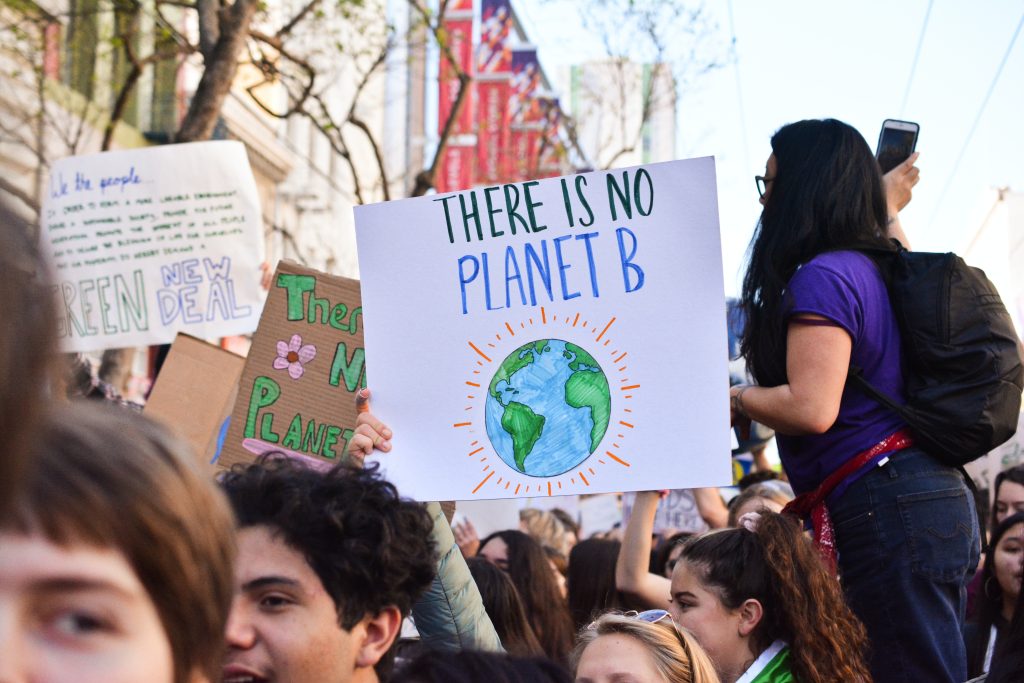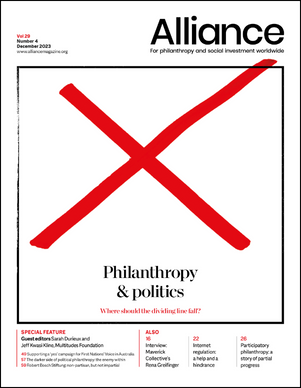Why is it essential that philanthropists and other actors help breathe new life into faltering democratic systems and institutions? Daniel Sachs, founder and CEO of P Capital Partners, vice chair of the board of Open Society Foundations and founder of the Daniel Sachs Foundation, discusses the question with guest editors Sarah Durieux and Jeff Kwasi Klein.
Sarah Durieux: Political philanthropy is a work that both you and we at Multitudes have decided to engage with because it’s really underfunded in Europe. Why do you think that is?
Daniel Sachs: I think part of that is because the relationship between money and politics has been very dysfunctional and problematic. There’s been a lot of self-interest, lobbying and corruption, so the notion that the private sector can have a role in developing the structures of democratic decision-making and political institutions is very alien to some people. That is a barrier that we have to cut through. If you go back a few decades, we had very strong institutions and what needed support was civil society and social movements because they were weaker. Today we have the opposite situation. Part of civil society and social movements are extremely strong, but trust for political institutions and for democracy is weaker than ever, and therefore I think that we in the private sector and in philanthropy really need to engage in systems change of democratic and political systems, but in a way that’s divorced from lobbying and narrow self-interest. We need to promote non-partisan systems change, and make politics trusted and effective again.
There’s a vicious circle between very low trust for politics, leading to low participation, which leads to poor representation, which in turn leads to even lower trust.
Jeff Kwasi Klein: What factors made you and the Daniel Sachs Foundation start funding this work?

The burgeoning of young peoples’ civic engagement with issues such as climate change has been accompanied by a growing lack of trust in institutions and the political system. Credit: Unsplash
DS: We started supporting civil society and activism and, specifically, a lot of our work was around inclusion and anti-discrimination. Ten years ago, we realised that people, and young people especially, were distancing themselves from institutions and politics. There is a very clear gap today between social movements and civil society on the one hand, and institutions on the other. Promisingly, we have enormously strong political and social engagement by young people. We’ve seen them engage civically and socially in everything from the environmental movement to social justice, racial justice and inclusion. At the same time, trust in institutions, politics, and democracy as a system is lower than ever. To me, that is a meta-issue: it doesn’t matter whether you’re focused on solving the climate challenge, or if you’re a peace activist, or if you’re working on social justice or inclusion, we’re not going to be successful in addressing those challenges unless we get politics to a place where it’s deeply trusted and makes a difference. For that to happen, it needs to be representative. This is the issue we need to work on, since a core reason young people don’t engage politically is the lack of representation. There’s a vicious circle between very low trust for politics, leading to low participation, which leads to poor representation, which in turn leads to even lower trust. We identified that the way to break that vicious circle is through representation. Eight out of 10 young people who abstain from voting do this because they don’t feel represented by the political establishment.
SD: What does your experience of funding teach you about effective ways to change politics for the better?
DS: I think there are two schools of thought: one is the people school, the other is the systems school. Some say there’s no use promoting new politics or new people into politics as long as the system is flawed because they’re just going to repeat the same dysfunctions. Others say that people change systems, and if different people are involved in decisions, politics will change. We mostly subscribe to the second view, which is why most of our work has been improving representation and broadening recruitment into politics, especially for people with under-represented backgrounds. But the systems bit is also important, and much work is needed to close the gap between citizens and institutions. Some of that has to do with technology, with deliberative budgeting, citizens’ assemblies and deliberative decision-making.
There are no quick fixes. Fundamental systems change, and getting the political system in different countries to a position where it enjoys widespread trust and participation is not something you achieve quickly.
SD: An essential element of politics is political parties. How do you envision working with that part of the system while remaining non-partisan?
DS: The work we do is non-partisan, but it’s based on specific democratic values which are not always fully practised. Of course, political parties are a really important part of the system. If you ask people in Europe where they stand ideologically, an overwhelming majority stand in a broad centre – people who believe in a regulated market economy, free trade, controlled and legal migration, functioning welfare systems, climate action, etc. But quite a few of those still choose more extreme political alternatives, and, in most cases, the reason is not ideological, it’s institutional. It’s because they don’t feel that the established parties in the centre are credible change agents who can change their daily lives. And while that’s depressing from a party point of view, it’s also a fantastic opportunity. The established parties don’t need to change their ideology, but should rather dig deeper where they stand. Instead, institutionally, these parties need to change to become more credible in driving change. That can be done in a number of ways: new people, new voices, communicating in new ways, and it’s also about changing policies and closing the gap for citizens. Alternatively, quite a few parties are moving ideologically closer to the fringes. To me, that is the challenge for the parties and we, as civil society non-partisan actors, can help with that by funding experimentation on how to close the gap with citizens. We can train and equip some of those fantastic young leaders from civil society to enter politics.
JKK: One of the complicating factors about politics is that it’s hard to measure impact. What signs have you seen that would attest to the potential impact of political work?
DS: There are no quick fixes. Fundamental systems change, and getting the political system in different countries to a position where it enjoys widespread trust and participation is not something you achieve quickly. When we started our political leadership incubators seven years ago, we said we could only begin to evaluate it from a systems perspective in 10 years. That said, individuals who’ve come out of our programmes have achieved fantastic results in their respective contexts. That’s extremely hopeful and attests to the power of strong leadership to move issues. Still, we’re talking about systems built up over decades and centuries, and we need the patience to do it properly.
JKK: Once we know we are working within a system based on short-termism, how do we convince others to be patient?
DS: Increasingly, we find the sense of urgency is there. People know that the lack of trust in politics and democracy is becoming existential, and the anecdotal short-term evidence from individuals and local examples is strong enough to see that engagement really makes a difference. Philanthropy is obsessed with measurability, but a lot of the really important things in life aren’t measurable – friendship or love or democracy, for that matter. You either trust that those are things that make life meaningful, or you don’t.
SD: I completely agree with that. When we set up Multitudes, we talked about care and a human touch to politics. We don’t just want to provide funding but also a community of support for people. Apart from funding, what else do you think is needed?
DS: If we want people to go from social movements into politics successfully, a lot of training needs to happen. Some of that involves developing very concrete skills, but there’s also a dimension that I would call institutional or political adaptation. Activists play a specific role with specific rationales for tackling an issue, but if you move inside the institution, other methods like reaching compromises or advocating for incremental changes are required. Certain lessons are generalisable, but there are also a lot of individual lessons, and that’s where mentoring and the network come in. Political parties traditionally have very long recruitment pipelines, and people grow up within a party. Often, the people we engage with come in at a later stage, and it takes work to make yourself heard, understand the codes, and have real influence. One way to do that is to be surrounded by a broad and supportive network of like-minded people who have made the same journey, so we’re working on building that community globally.
JKK: As Sarah mentioned, we are in the process of building an ecosystem of critical changemakers. In the next 10 years or so, how can this ecosystem develop?
DS: We want ‘politician’ to be on the top 10 list of desired roles in society in the next 10 years. And if we start getting positive momentum in politics where it becomes more representative and transformative, is there anything more rewarding or exciting? In democracies, over time we get the politicians we deserve, and it’s really up to us to work together as communities to make sure that politics makes a fundamental difference again.
SD: You engage in many different ways with the Daniel Sachs Foundation. You mentioned Apolitical Foundation, you’re supporting Multitudes Foundation, for example. How did you come up with this kind of spread of initiatives?
DS: Starting from inclusion, we realised that the renewal of politics and democracy is key for successful social change. We began mobilising young people to vote but realised that if we really want to change how they relate to democracy and politics, we can’t appear three weeks before the election and tell them to vote. We have to work in more systemic, long-term ways. We identified, as I said earlier, that representation is key and seeing so much socially and politically engaged talent in social movements, it made sense to create the pipeline from that pool of talent into politics and that’s why we started the political leadership incubators which now reach 25 countries, and will be launched in another 12 during next year. We also saw how difficult it is to get the private sector to engage, and that was really the idea behind founding Multitudes: to provide much-needed support for the emerging field of political changemakers in Europe, by mobilising the private sector and building a safe intermediary to make sure that more people in the private sector would do this work. It’s really an organic process where we identify challenges as we go along and think about ways for how we can engage.
JKK: You talked a lot about enabling this systemic change. What is your message to other potential enablers?
DS: There are a number of reasons to engage in this. One is self-interest. Whether we’re philanthropists, business people, or in the public sector, we depend on democratic and free societies with a strong rule of law and protection of human rights. I also think we have a responsibility to give back because we’ve prospered thanks to living in democratic societies. We’ve been able to live in ways that we want to and make our own choices freely, and now that some of those things are under threat, it’s time to give back to enable democratic systems to be trusted again as a fundamental force of change in society. Whatever your philanthropic mission is, I would recommend you use a fraction of your resources on non-partisan change of political and democratic systems, because it is existentially important that we get that right.







Comments (0)